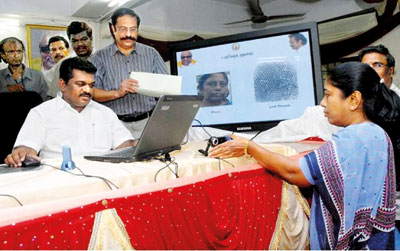Land fraud affects foreign and local investments
The question on the lips of many local and foreign investors is, “Can a country fraught with land fraud give security and relief to investors who, despite the ever-lurking dangers, have risked investing in Sri Lanka”? Sri Lanka has gained notoriety for being a haven for land fraudsters. The land- fraudsters are holding the people and the country to ransom by resorting to marketplace thievery and discouraging entrepreneurs.

Biometrics: Thumb impressions, iris scan at the Indian Land Registry and a certificate attached to the deed from the notary is require for all land sales. Picture courtesy the hindu.com.
The attacks on the Government Land Registry are frequently published. A few appeared recently (1) An elderly couple evicted by someone with forged deeds in Colombo 7 valued over a billion rupees, (2) CID arrests master swindler and his gang selling land with forged deeds, and (3)Thieves strike at multimillion-rupee homes of absentee landlords in well-organised racket targeting properties whose owners are either dead or abroad
Land fraud is a direct attack on entrepreneurs and banks, an insidious attack on our core values to which we cling dearly as votaries of different faiths. Land fraud and mortgage fraud over the past years has grown significantly threatening the stability of local banks. It is unfortunate that the Government, media nor the business forums have not taken any meaningful steps to question as to why Sri Lanka’s land rights are carelessly handled by archaic laws, which are highly advantageous to fraudsters.
At a fundamental level, most commercial enterprises require land, to conduct their business. It, therefore, behoves on the Government, attempting to attract foreign investments into the country, to ensure that when land is bought by investors, the land is securely registered and that the entrepreneur is assured that there will be no claims or fraudulent transactions to defeat his ownership.
It is in this backdrop that Sri Lanka has introduced technology to land registries hoping to plug fraud and to climb to a better place in the ‘Doing Business Index.
According to newspaper reports, the Government is to introduce an online property registration service, aiming for quick wins to move up the 2019 Ease of Doing Business rankings of the World Bank.
The Sri Lankan government will be introducing online property search and registration services for the city of Colombo, while other regions would be left waiting for another two years.
It is significant to note that the top 20 countries in the ‘Doing Business Index’ have heavily invested in ‘research relating to systems of fraud’ and that they have introduced modern vital laws to maintain the security of the land register.
The electronic register has already commenced in Sri Lanka taking the fast track to technology. Unfortunately, technology operates with the laws of the previous millennium and, considering the frequency and the deviousness of the land fraud taking place can the electronic register prevent fraudulent documents entering the register? The vision at the beginning of the 21st century was of an automated land registration system running alongside a fully integrated digital information system. This can only be a dream when the system operates with the laws introduced during the colonial period in the early 20th century.
Secure land registry needed
The laws that protect the land register (whether it is a paper register or an electronic register) from fraudsters need to be first introduced. What is essential is to protect the identity of the registered owners with the supporting documents.
This is imperative. The owners’ names should not be defaced by mere land documents. Owners’ identity needs to be preserved in the biometric form with methods of archiving of documents by solicitors.
Technology may favour fraudsters
Indeed, the introduction of technology to land registries may be an advantage to fraudsters. They will be able to move ownership rights faster in the absence of laws to identify and verify owners with illegible signatures on documents. As practiced today the signature of an owner can be placed illegibly in any language with a character or designation he wishes to assign. For example, he can use an abbreviated form or even a ‘substitute’ name for a name such as Tudor Williams; he could sign as ‘William Tudor’ or even simply ‘William’. Identifying an owner with an ID card is quite unreliable because they can be forged, the name of an individual may be different after marriage.
Furthermore, the address often differs from the address given in the deed; consequently, fraudsters cannot be located.
New Assurance Fund
According to the new law introduced from Australia, if the rightful owner loses the right of ownership by a fraudulent transaction, he will be compensated for the loss through the land registry ‘Assurance Fund’. The ownership will not be restored by annulling the fraudulent transaction as in the deed registration system that operated in Sri Lanka.
It may be therefore be very relevant to note the laws of Australia which are applied to preserve the integrity of the Government land registry. Ms. Maya Nanayakkara,LL.M (Syd) Principal Solicitor Nan Solicitor Conveyancers explains that it is a requirement in Australia, to identify a client at the beginning of any land transaction.
Usually it’s a face to face identification with checks of three identification documents; passports/driver licence and Photo identification. Copies of these identification documents must be kept with the lawyer in a confidential folder that is easily available for checking by the Revenue Office or Law Society of Australia.
Once a property transaction settles and goes to the Land Registry, signatures of transacting parties are closely scrutinized by the Registrar and title documents may be rejected if the signatures of owners are not legible .


